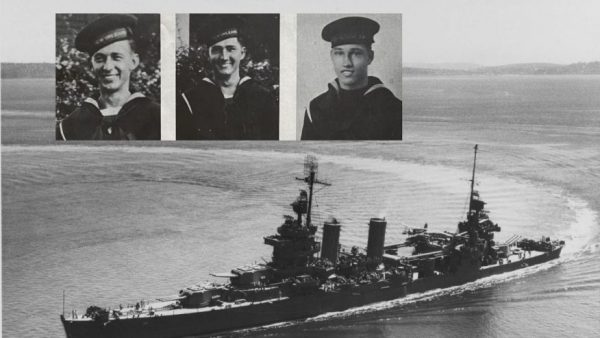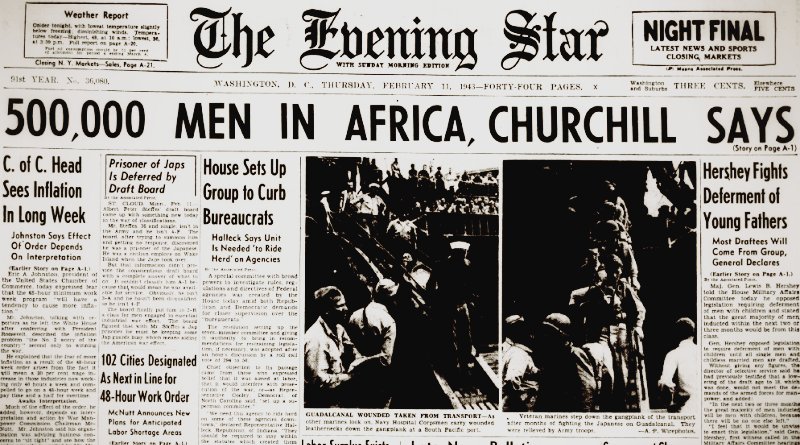World War II Chronicle: February 11, 1943
Click here for TODAY’S NEWSPAPER
Page two reports that Pres. Roosevelt has nominated Lt. Gen. Dwight Eisenhower for promotion to full general. That will make him the fourth four-star general in American history, joining John J. Pershing, Douglas MacArthur, and George Marshall… On page three, 17-year-old Hugh Rogers, the brother of three sailors killed aboard the USS New Orleans during the Battle of Tassafronga, is joining the Navy. The Navy will name the Gearing-class destroyer USS Rogers (DD-678) in honor of Hugh’s older brothers Edward, Jack, and Charles…

Capt. Billy Southworth Jr., son of the St. Louis Cardinals manager, flies bombers in the Army Air Force, and is pictured on page three… George Fielding Eliot column on page 12… Sports on page 21… Movie star Tyrone Power is pictured on page 22 washing his clothes during Marine boot camp in San Diego…
Roving Reporter by Ernie Pyle
A FORWARD AIRDROME IN FRENCH NORTH AFRICA — It is hard for a layman to understand the fine points of aerial combat as practiced at the moment in North Africa. It is hard even for the pilots themselves to keep up, for there are changes in tactics from week to week.
We will have some new idea and surprise Germans with it. Then they’ll come across with a surprise maneuver, and we will have to change everything to counteract it.
But basically, at the moment, you can say that everything depends on teamwork. The lone dashing hero in this war is certain to be a dead hero within a week. Sticking with the team and playing it all together is the only guarantee of safety for everybody.
Our fighters go in groups with the bombers, ranging the sky above them, flying back and forth, watching for anything that may appear. But if they see some Germans in the distance nobody goes after them. That would be playing into the Germans’ hands. So they stick to their formation above the bombers, making an umbrella.
The German has two choices — to dive down through them, or to wait until somebody is hit by flak and has to drop back. Then they are on him in a flash.
When that happens the fighters attack, but still in formation. Keeping that formation always and forever tight is what the flight leaders constantly drill into the boys’ heads. It is a great temptation to dash out and take a shot at some fellow, but by now they’ve seen too many cases of the tragedy of such action.
The result is that this war doesn’t have many individual air heroes. A team may be a complete hero, but not an individual.
One group leader told me: “If everything went according to schedule we’d never shoot down a German plane. We’d cover our bombers and keep ourselves covered and everybody would come home safe.”
The fighter pilots seem a little different from the bomber men. Usually they are younger. Many of them were still in school when they joined up. Ordinarily they might be inclined to be more harum-scarum, but their work is so deadly, and the sobering dark cloud of personal tragedy is over them so constantly, that it seems to have humbled them. In fact I think it makes them nicer people than if they were cocky.
They have to get up early. Often I’ve gone to the room of my special friends at 9:30 in the evening and found them all asleep.
They fly so frequently they can’t do much drinking. One night recently when one of the most popular fighter pilots was killed right on the home field, in an accident, some of them assuaged their grief with gin.
“Somehow you feel it more when it happens right here than when a fellow just doesn’t come back,” they said.
When they first came over here, you’d frequently hear pilots say they didn’t hate the Germans, but you don’t hear that any more. They have lost too many friends, too many roommates.
Now it is killing that animates them.
The highest spirits I’ve seen in that room were displayed one evening after they came back from a strafing mission. That’s what they like to do best, but they get little of it. It’s a great holiday from escorting bombers, which they hate. Going out free-lancing to shoot up whatever they see, and going in enough force to be pretty sure they’ll be superior to the enemy — that’s Utopia.
That’s what they had done that day. And they really had a field day. They ran onto a German truck convoy and blew it to pieces. They’d laugh and get excited as they told about it. The trucks were all full of men, and “they’d fly out like firecrackers.” Motorcyclists would get hit and dive 40 feet before they stopped skidding.
Two Messerschmitt 109s made the mistake of coming after our planes. They never had a chance. After firing a couple of wild bursts they went down smoking, and one of them seemed to blow up.
The boys were full of laughter when they told about it as they sat there on their cots in the dimly lighted room. I couldn’t help having a funny feeling about them. They were all so young, so genuine, so enthusiastic. And they were so casual about everything — not casual in a hard, knowing way, but they talked about their flights and killing and being killed exactly as they would discuss girls or their school lessons.
Maybe they won’t talk at all when they finally get home. If they don’t it will be because they know this is a world apart and nobody else could ever understand.
Evening star. (Washington, D.C.), 11 February 1943. Chronicling America: Historic American Newspapers. Lib. of Congress.
https://chroniclingamerica.loc.gov/lccn/sn83045462/1943-02-11/ed-1/
